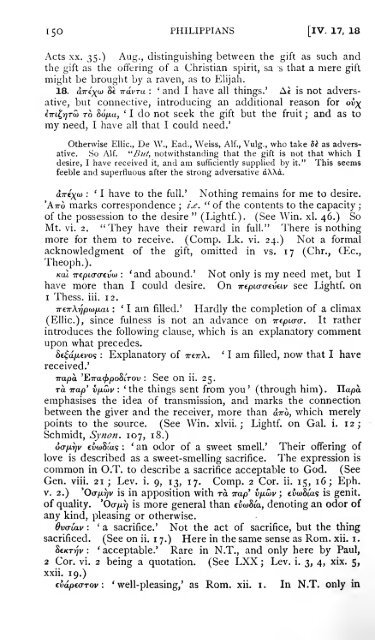Philippians and Philemon - MR Vincent - 1906.pdf
Philippians and Philemon - MR Vincent - 1906.pdf
Philippians and Philemon - MR Vincent - 1906.pdf
You also want an ePaper? Increase the reach of your titles
YUMPU automatically turns print PDFs into web optimized ePapers that Google loves.
1 50 PHILIPPIANS [IV. 17, 18<br />
Acts XX. 35.) Aug., distinguishing between the gift as such <strong>and</strong><br />
the gift as the offering of a Christian spirit, sa s that a mere gift<br />
might be brought by a raven, as to Elijah.<br />
18. :<br />
' <strong>and</strong> I have all things.' Ak is not advers-<br />
' 8, I do not seek the gift but the fruit ; <strong>and</strong> as to<br />
ative, but connective, introducing an additional reason for<br />
my need, I have all that I could need.'<br />
Otherwise Ellic, De W., Ead., Weiss, Alf., Vulg., who take as adversative.<br />
So Alf. "But, notwithst<strong>and</strong>ing that the gift is not that which I<br />
desire, I have received it, <strong>and</strong> am sufficiently supplied by it." This seems<br />
feeble <strong>and</strong> superfluous after the strong adversative.<br />
:<br />
' I have to the full.' Nothing remains for me to desire.<br />
marks correspondence ; i.e. " of the contents to the capacity ;<br />
of the possession to the desire " (Lightf.). (See Win. xl. 46.) So<br />
Mt. vi. 2. "They have their reward in full." There is nothing<br />
more for them to receive. (Comp. Lk. vi. 24.) Not a formal<br />
acknowledgment<br />
Theoph.).<br />
of the gift, omitted in vs. 17 (Chr., (Ec,<br />
: '<strong>and</strong> abound.' Not only is my need met, but I<br />
have more than I could desire. On irepiaaeveiv see Lightf. on<br />
1 Thess. iii. 12.<br />
IT , '<br />
: I am filled.' Hardly the completion of a climax<br />
(Ellic), since fulness is not an advance on. It rather<br />
introduces the following clause, which is an explanatory comment<br />
upon what precedes.<br />
Se^ot/xevos : Explanatory ' of. I am filled, now that I have<br />
received.': See on ii. 25.<br />
Trap' : 'the things sent from you' (through him).<br />
emphasises the idea of transmission, <strong>and</strong> marks the connection<br />
between the giver <strong>and</strong> the receiver, more than , which merely<br />
points to the source. (See Win. xlvii. ; Lightf. on Gal. i. 12;<br />
Schmidt, Synon. 107, 18.)<br />
:<br />
' an odor of a sweet smell.' Their offering of<br />
love is described as a sweet-smelling sacrifice. The expression is<br />
common in O.T. to describe a sacrifice acceptable to God. (See<br />
Gen. viii. 21 ; Lev. i. 9, 13, 17. Comp. 2 Cor. ii. 15, 16; Eph.<br />
V. 2.) is in apposition with ' ; £5 Is genit.<br />
of quality. 'is more general than,denoting an odor of<br />
: any kind, pleasing or otherwise.<br />
'a<br />
sacrifice.' Not the act of sacrifice, but the thing<br />
sacrificed. (See on ii. 1 7.) Here in the same sense as Rom. xii. i.<br />
: ' acceptable.' Rare in N.T., <strong>and</strong> only here by Paul,<br />
2 Cor. vi. 2 being a quotation. (See LXX ; Lev. i. 3, 4, xix. 5,<br />
xxii. 19.)<br />
ivapearov :<br />
* well-pleasing,' as Rom. xii. i. In N.T. only in





